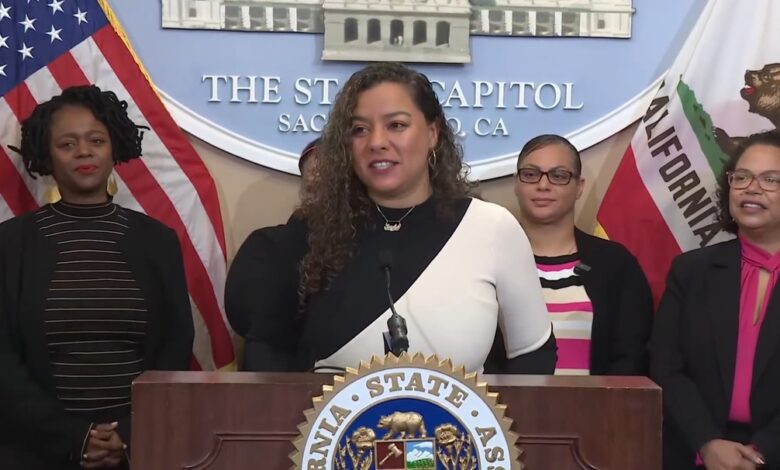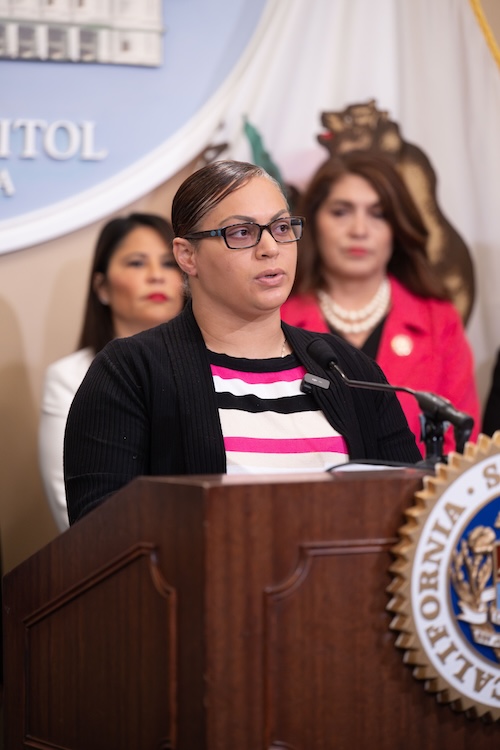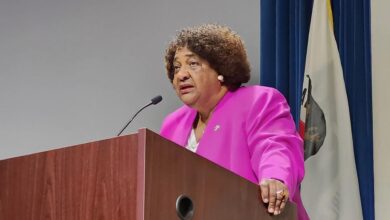
By Antonio Ray Harvey | California Black Media
Some members of the California Black Legislative Caucus (CLBC) joined Assemblymember Susan Quirk-Silva (D-Fullerton) and the Women’s Legislative Caucus at a press conference on April 3 to demand justice and fairness for incarcerated woman in California.
CLBC members Assemblymember Mia Bonta (D-Alameda), Sade Elhawary (D-Los Angeles), Sen. Lola Smallwood-Cuevas (D-Ladera Heights), and prison reform advocates outlined their plans for justice reforms related to the health and wellbeing of incarcerated women.
“Our justice system has long overlooked the unique needs of incarcerated women, and it’s time for a change,” Quirk-Silva said. “When we incarcerated women without addressing underlying causes, we are not just punishing them, we are punishing their children and destabilizing their families.”

Assemblymembers Liz Ortega (D-San Leandro) and Sen. Caroline Menjivar (D-Burbank) also participated in the event held at the State Capitol. During the conference, the lawmakers announced legislation they have introduced to back their demands.
Elhawary is the author of Assembly Bill (AB) 1231, which would give judges the discretion to connect individuals on trial to treatment and services instead of spending prison time.
“But policy alone isn’t enough,” Elhawary said. “I’m fighting in this year’s budget to expand investment in reentry housing education and rehabilitation program because a sentence shouldn’t have to be a life sentence to poverty and instability.”
California operates 32 prisons and one leased prison, including 29 men’s prisons, two women’s prisons, and one prison that houses both men and women in separate facilities, according to the Legislative Analyst’s Office (LAO).
Quirk-Silva, Bonta, Smallwood-Cuevas, and advocates speaking at the conference all agreed that to effectively reform California women’s prisons, the state must institute gender-responsive, trauma-informed, and strength-based approaches.
Advocates insist that the initiatives should address the specific needs and experiences of incarcerated women, including considering alternatives to incarceration, and ensuring access to education, vocational training, and mental health services.
Menjivar introduced Senate Bill (SB) 337 that expands the rights of incarcerated people, including requiring a third-party advocate for searches, a documentation of searches, and extending the window for women inmates to report sexual assaults.
Smallwood-Cuevas’ SB 75 would require the California Workforce Development Board to establish a Reentry Pilot Project in the counties of Alameda, Los Angeles, and San Diego to provide workforce training and transitional support to formerly incarcerated individuals committed to careers in the skilled trades.
Ortega, the author of AB 800, said it would deal with price gouging in prisons. Families that visit their loved ones pay an enormous amount of money to purchase food out of vending machines, she said.
“I’m learning about facilities that are charging up to $15 for a tiny frozen hamburger. That’s not okay,” Ortega said.
According to the California Public Policy Institute (PPIC), women make up about 50 % of the state’s population but 4% of the prison population. Black men and women account for 28% and 23%, respectively of prisoners.
On April 2, the California Department of Corrections and Rehabilitation (CDCR) released an 81-page recidivism report showing that the recidivism rate for people released in the fiscal year 2019-20 declined by 2.8 % points over the previous year to 39.1%. The data reveals rehabilitative programming may be instrumental in reducing recidivism, the CDCR reported.
“With the limited resources that we’ve applied to rehabilitation reentry efforts, we’ve seen a decrease in recidivism markedly over the course of three years in the study just published,” Bonta said. “Imagine what we do if we applied more resources to the basic concept of suppling women rehabilitation rehab reentry.”
According to (CDCR), in 2022, there were 3,699 people incarcerated in women’s prisons in California, about 175 of whom have a sentence of life without the possibility of parole. Close to 929 people in women’s prisons are Black — 25% of the state’s overall prison population in 2022.
California is one of the few states in the country where the number of people incarcerated in women’s prisons is significantly decreasing — from 12,668 people in 2010 to 3,699 people in 2022, a 70.8% reduction, according to Ending the Harm of Women in Prisons (EHWP). About 54.3% of the women’s prisons in California have at least one child.
Quirk-Silva is the author of AB 923. The bill would authorize a pregnant or postpartum defendant to request a stay of execution of their sentence by filing a written request to the court if the individual is detained or incarcerated in a county jail for any length of time through the end of the pregnancy.
“Individuals housed in county jails used to be there a short time. Now they can be there one, two, three, four, five years,” Quirk-Silva said. “Do women need to go to jail while they are pregnant?”




